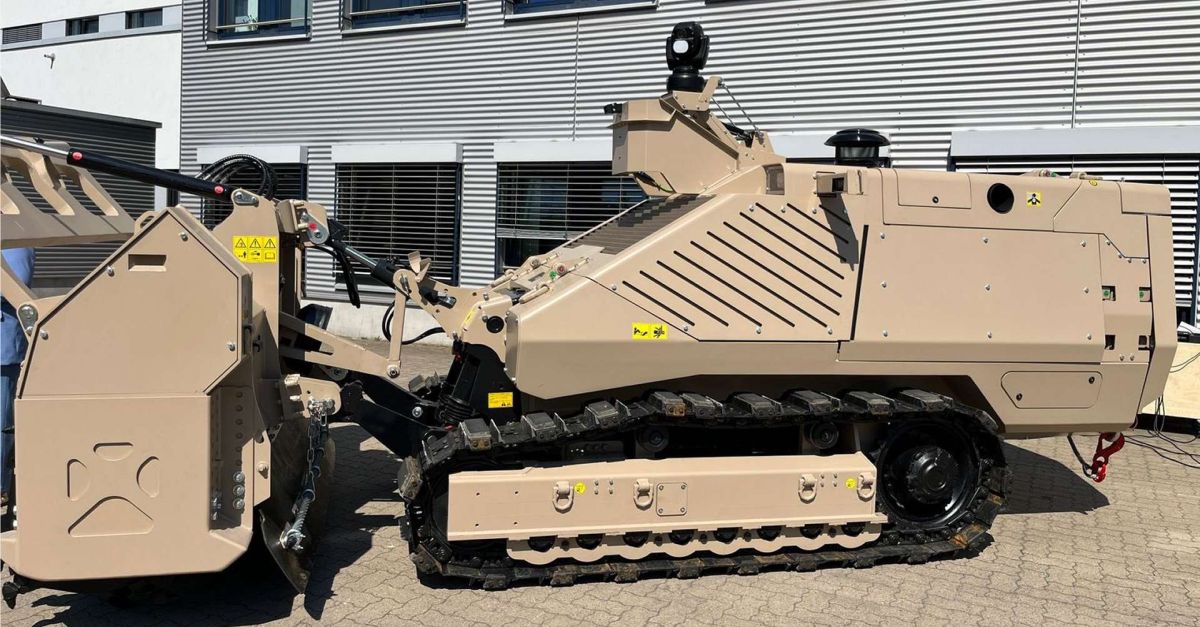Breaking news
German city of Hamburg delivers first GCS-200 remote-controlled demining vehicle to Ukraine.
On May 13, 2024, the first GCS-200 remote-controlled demining vehicle was officially transferred by Hamburg's Senator of the Interior to the Ukrainian Ambassador to Germany. This machine, set to commence operations in June, signals the start of a series of deliveries aimed at supporting Ukraine in its demining efforts. By August, Ukraine is slated to receive three more GCS-200 units from the city of Hamburg.
Follow Army Recognition on Google News at this link

This GCS-200 demining vehicle, set to commence operations in June, signals the start of a series of deliveries, with three more GCS-200 units expected to be supplied by the city of Hamburg. (Picture source: Oleksii Makeiev)
The decision to enhance support for Ukraine's demining efforts was made by the Hamburg Senate on September 12, 2023. The Senate approved measures to streamline the procurement and distribution of aid supplies, allocating approximately €10 million for crisis assistance. Building on the "Pact for Solidarity and Future" signed between Hamburg and Kyiv, this partnership has facilitated the extensive delivery of aid, including medical supplies and demining equipment, partly funded by citizen donations.
The Swiss company Global Clearance Solutions (GCS) has played a significant role in supplying an increased quantity of demining equipment to Ukraine. Although the exact number of units delivered to date is unspecified, Canada donated two GCS-200 units in May 2023, and Germany delivered three units in January 2023. Furthermore, Germany plans to deliver seven additional units to Ukraine. As reported by Deaidua on December 12, 2023, GCS intends to significantly increase the number of demining platforms supplied to Ukraine, aiming for a total of 70 units by mid-2024. The company plans to deliver 25 vehicles by the last quarter of 2023, 40 in the spring of 2024, and reach the target of 70 units by mid-2024. This commitment includes an incremental increase to 60 units by mid-2024, reflecting GCS's willingness to enhance Ukraine's demining capabilities.
The GCS-200 is a key product of Global Clearance Solutions, as one of its two remote-controlled demining platforms designed for mine clearance tasks. It is equipped with a tiller that reaches depths of up to 31.5 cm and a flail for ground clearance, capable of neutralizing both anti-personnel (AP) and anti-tank (AT) mines. With a capacity to demine up to 12,000 square meters per day, the GCS-200 features a V-shaped hull for survivability in high-threat environments. It includes a manipulator arm for handling unexploded ordnance (UXO) and improvised explosive devices (IEDs), enabling lifting, excavating, and disrupting explosive devices. The vehicle's remote operation, supported by integrated camera systems, allows safe and precise demining activities from distances ranging from 300 to 3,500 meters, depending on the configuration.
The context for these efforts is Ukraine's status as the most heavily mined country in the world, primarily due to the Russian invasion and ongoing hostilities. The landmine crisis has resulted in an extensive minefield estimated to potentially cover 250,000 square kilometers, surpassing the size of the entire Korean Peninsula. In 2023, Ukraine made significant strides in acquiring mechanized demining equipment, with the number of machines increasing from 12 in March to nearly 60 by December. This progress was facilitated by support from various donors, including Japan, Canada, and Korea. However, the use of air bombs, rockets, and scattered munitions by Russian forces has complicated demining efforts and slowed clearance rates.
This growing demand for demining machines has attracted international manufacturers interested in supplying Ukraine. Foreign mine-clearing vehicles delivered to Ukraine include the German Wisent 1, the Slovakian Bozena-4 and Bozena-5, the Swiss Digger D-250, the South Korean K600 Rhino, and the American M1150 Assault Breacher Vehicle. However, as reported by Globsec, Ukrainian operators must carefully assess their specific needs to ensure efficient resource allocation, considering factors such as machine availability, production capacity, delivery time, spare parts, and maintenance services. Therefore, advanced government planning and centralized target setting are recommended by this NGO to optimize the procurement processes.
To further accelerate the supply of demining equipment, the Ukrainian government is encouraging local manufacturers to develop their production capabilities through joint ventures and cooperation with international OEMs (original equipment manufacturers). This initiative has led to the development of vehicles such as the Pozhmashina PM-B and an unnamed farm tractor-based unmanned ground vehicle (UGV). Supporting small and medium-sized enterprises (SMEs) and integrating Ukraine into international supply chains are key aspects of this strategy. Despite challenges such as limited manufacturing capacities and less advanced technologies domestically, the option of ordering equipment from abroad remains attractive and stays crucial to meet Ukraine's demining requirements successfully.


























